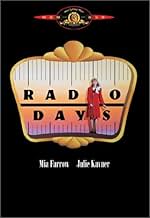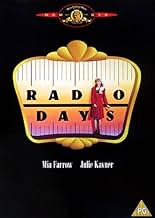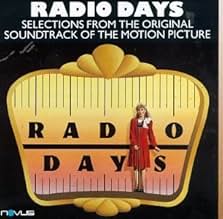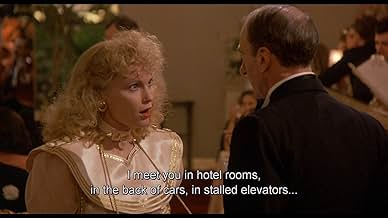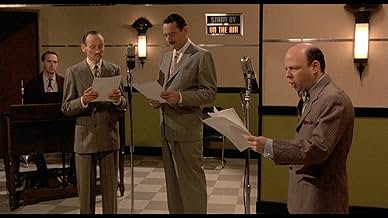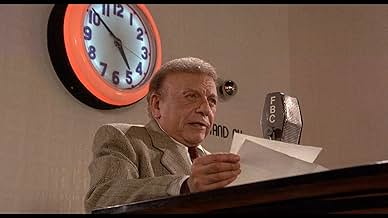Radio Days
- 1987
- Tous publics
- 1h 28m
IMDb RATING
7.4/10
38K
YOUR RATING
A nostalgic look at radio's golden age focusing on one ordinary family and the various performers in the medium.A nostalgic look at radio's golden age focusing on one ordinary family and the various performers in the medium.A nostalgic look at radio's golden age focusing on one ordinary family and the various performers in the medium.
- Nominated for 2 Oscars
- 3 wins & 10 nominations total
Mick Murray
- Avenger Crook
- (as Michael Murray)
Renée Lippin
- Ceil
- (as Renee Lippin)
- Director
- Writer
- All cast & crew
- Production, box office & more at IMDbPro
Featured reviews
Radio Days (1987) was written and directed by Woody Allen. The movie is set during the "golden years of radio," when radio programs, listened to at home, were an important aspect of American entertainment.
The film is narrated by Woody Allen, and is a nostalgic--and possibly autobiographical--look at the childhood of a young boy growing up in Rockaway, Queens. Allen grew up in Brooklyn, but the culture and customs of lower-middle class Jews in Rockaway would have been similar to those that Allen probably witnessed in Brooklyn.
The movie is set in the late 1930's and early 1940's. Surprisingly, World War II doesn't hold a prominent place in the film. Although the war was thousands of miles away, no aspect of life in the U.S. was untouched by it. Allen chose to concentrate on other matters--failed hopes, unfulfilled romances, and family bickering.
Despite these negative aspects of day-to-day life, the film projects a cheery, upbeat attitude. After all, it was a time when someone who looked like Wallace Shawm could star as radio's "Masked Avenger." Woody's subdued narrative lets us know that he loved those around him and was loved by them in turn.
Life wasn't perfect, but it could have been worse, and who knew what good things the future might bring.
We saw Radio Days on DVD. It probably would work somewhat better on the large screen, but it's worth seeking out and seeing in any format.
The film is narrated by Woody Allen, and is a nostalgic--and possibly autobiographical--look at the childhood of a young boy growing up in Rockaway, Queens. Allen grew up in Brooklyn, but the culture and customs of lower-middle class Jews in Rockaway would have been similar to those that Allen probably witnessed in Brooklyn.
The movie is set in the late 1930's and early 1940's. Surprisingly, World War II doesn't hold a prominent place in the film. Although the war was thousands of miles away, no aspect of life in the U.S. was untouched by it. Allen chose to concentrate on other matters--failed hopes, unfulfilled romances, and family bickering.
Despite these negative aspects of day-to-day life, the film projects a cheery, upbeat attitude. After all, it was a time when someone who looked like Wallace Shawm could star as radio's "Masked Avenger." Woody's subdued narrative lets us know that he loved those around him and was loved by them in turn.
Life wasn't perfect, but it could have been worse, and who knew what good things the future might bring.
We saw Radio Days on DVD. It probably would work somewhat better on the large screen, but it's worth seeking out and seeing in any format.
This is a wonderful wonderful movie that exemplifies the phrase, "misty watercolored memories." It is a joy to watch and listen to. The era before and during WWII, however, was anything but wonderful. Radio Days presents a time when America was dealing with the Great Depression and its after effects and the horrible event that was World War II. Since the man narrating the memories was only a boy then, it is altogether fitting and proper that he see things as a child; for as he states in one scene, "our conversation turned from Nazis to more important things,like girls." No movies, except this one, that I recall, are able to deal with this critical age in American history without conveying the tragic time that it was.
I would like to think this family was really Woody Allen's, but it is probably a work of fiction, like his other pieces. But how tremendous that he can create (or remember) these people. As I watched it, one thought that kept recurring was that these were not "beautiful" manufactured people like we see in the media today; they had big hips and were fat and poor and... and none of that mattered. They were real. They were believable. You can't watch this movie without wondering what happened to them, did Aunt Bee find a husband? You cared about this family and personally, I wished they were mine.
The vignettes were sad and sweet. My favorite was poor departed Kirby Kyle; at least he had heart! And Leonard; and "donations for the promotion of a state in Palestine." So many memories that make us a part of a family most people never had. The viewer belongs to this warm and loving group.
Something has been lost with the concept of "nuclear family," with the lonely big houses and empty hours and unshared hopes and sorrows. Radio Days reminds us that having someone to experience life with is a treasure and a blessing, despite whacks on the head, martians, and fish, "That man always brings home fish!"
And oh, the music!
This is Woody Allen's masterpiece.
I would like to think this family was really Woody Allen's, but it is probably a work of fiction, like his other pieces. But how tremendous that he can create (or remember) these people. As I watched it, one thought that kept recurring was that these were not "beautiful" manufactured people like we see in the media today; they had big hips and were fat and poor and... and none of that mattered. They were real. They were believable. You can't watch this movie without wondering what happened to them, did Aunt Bee find a husband? You cared about this family and personally, I wished they were mine.
The vignettes were sad and sweet. My favorite was poor departed Kirby Kyle; at least he had heart! And Leonard; and "donations for the promotion of a state in Palestine." So many memories that make us a part of a family most people never had. The viewer belongs to this warm and loving group.
Something has been lost with the concept of "nuclear family," with the lonely big houses and empty hours and unshared hopes and sorrows. Radio Days reminds us that having someone to experience life with is a treasure and a blessing, despite whacks on the head, martians, and fish, "That man always brings home fish!"
And oh, the music!
This is Woody Allen's masterpiece.
10bbbaldie
This movie shouts one word: WARMTH. The colors, the plot, the characters, they are all wonderfully warm.
I've watched this movie with senior citizens who were around in the forties. I once watched it with a Jewish guy who grew up on Long Island (albeit in the early 30's, not the 40's). All comments were the same: THIS was life in New York during wartime.
Vietnam was my war, so this era was a mystery to me. However, any time a genius like Woody Allen can create a film that not only makes me and my rowdy friends laugh, but gets guffaws from my dear old Mom as well, it deserves a little fanfare.
I didn't even mention the solid gold music.
See this film at once!
I've watched this movie with senior citizens who were around in the forties. I once watched it with a Jewish guy who grew up on Long Island (albeit in the early 30's, not the 40's). All comments were the same: THIS was life in New York during wartime.
Vietnam was my war, so this era was a mystery to me. However, any time a genius like Woody Allen can create a film that not only makes me and my rowdy friends laugh, but gets guffaws from my dear old Mom as well, it deserves a little fanfare.
I didn't even mention the solid gold music.
See this film at once!
In preface, let me say that I was born at the tail-end of the "golden age of radio," but just in time to experience a touch of its magic and the hold it had on households night after night in that pre-TV era. Add to that a favorite aunt who had worked in radio for years on the West Coast and who regaled her nephew with story upon story, which in turn led to the years I later spent in radio (luckily, prior to the "formula radio" days). It all adds up to my absolutely having to go see "Radio Days" when it first came out, despite the fact that I'd never been the world's foremost Woody Allen fan. Too much of his work, for me, lacked that indefinable but oh so recognizable element of "heart."
Well, I was wrong about Woody. This film shows it.
Autobiographical -- or perhaps semi-autobiographical -- in nature, "Radio Days" evokes the time when people returned "to those thrilling days of yesteryear," and for whom, quite probably, it was equally thrilling to contemplate the magic of a box in their living room that could cause them to "watch" the stories unfold in their minds. "Remotes," or on-the-spot broadcasts transported them to the scene of unfolding tragedies or triumphs in a way that newspapers never could (and which TV, for all its advantages, rarely matches).
And yet the film, for all its authenticity in recreating studio practices (watch, for example, how the actors drop completed script pages onto the floorrather than turning them and risking a tell-tale rustle of paper), isn't really so much about radio itself as it is about the people who listened, as personified by one raucous, cantankerous and loving Brooklyn family. Beautifully evoked, particularly by Julie Kavner (Mother), Michael Tucker (Father), and the incomparable Dianne Wiest (as the perenially lovelorn Aunt Bea), it is their reactions to what they hear on the radio -- whether listening breathlessly to the war news (at a time when the end result was anything but certain) or Bea's abandonment in the middle of nowhere by a panicked suitor as Orson Welles' "War of the Worlds" broadcast takes hold -- that bring to life the era and the power of that medium.
Standouts? The whole cast is perfect, but for me, in addition to those previously mentioned, I have to cit Mia Farrow's portrayal of the dim-bulbed Sally White, who transforms herself with the aid of speech lessons into a radio personality. (For that matter, catch Danny Aiello as a less-than-brilliant hitman, particularly his scenes with Dina DeAngeles as his mom.)
Criticisms? One: At the end of a poignant scene in which young Joe has finally discovered what his dad does for a living, Allen insists on falling into some standby "schtick" in his voiceover. (I guess he couldn't resist; thankfully, it doesn't ruin the moment.)
Ultimately, of course, it is the era itself that this film celebrates. Faithfully, and lovingly, it is recreated with a skill that points up its absurdities at the same time it makes one hopefully nostalgic. And, if you're not very careful, you wind up falling hopelessly in love with this funny, obscure Brooklyn family.
And to the end of my days, I'll always wonder whether poor Aunt Bea ever did find her "Mr. Right" . . .
Well, I was wrong about Woody. This film shows it.
Autobiographical -- or perhaps semi-autobiographical -- in nature, "Radio Days" evokes the time when people returned "to those thrilling days of yesteryear," and for whom, quite probably, it was equally thrilling to contemplate the magic of a box in their living room that could cause them to "watch" the stories unfold in their minds. "Remotes," or on-the-spot broadcasts transported them to the scene of unfolding tragedies or triumphs in a way that newspapers never could (and which TV, for all its advantages, rarely matches).
And yet the film, for all its authenticity in recreating studio practices (watch, for example, how the actors drop completed script pages onto the floorrather than turning them and risking a tell-tale rustle of paper), isn't really so much about radio itself as it is about the people who listened, as personified by one raucous, cantankerous and loving Brooklyn family. Beautifully evoked, particularly by Julie Kavner (Mother), Michael Tucker (Father), and the incomparable Dianne Wiest (as the perenially lovelorn Aunt Bea), it is their reactions to what they hear on the radio -- whether listening breathlessly to the war news (at a time when the end result was anything but certain) or Bea's abandonment in the middle of nowhere by a panicked suitor as Orson Welles' "War of the Worlds" broadcast takes hold -- that bring to life the era and the power of that medium.
Standouts? The whole cast is perfect, but for me, in addition to those previously mentioned, I have to cit Mia Farrow's portrayal of the dim-bulbed Sally White, who transforms herself with the aid of speech lessons into a radio personality. (For that matter, catch Danny Aiello as a less-than-brilliant hitman, particularly his scenes with Dina DeAngeles as his mom.)
Criticisms? One: At the end of a poignant scene in which young Joe has finally discovered what his dad does for a living, Allen insists on falling into some standby "schtick" in his voiceover. (I guess he couldn't resist; thankfully, it doesn't ruin the moment.)
Ultimately, of course, it is the era itself that this film celebrates. Faithfully, and lovingly, it is recreated with a skill that points up its absurdities at the same time it makes one hopefully nostalgic. And, if you're not very careful, you wind up falling hopelessly in love with this funny, obscure Brooklyn family.
And to the end of my days, I'll always wonder whether poor Aunt Bea ever did find her "Mr. Right" . . .
Radio Days (1987)- written, directed, and narrated by Allen:
What a beautiful, kind, gentle, ironic, warm, sentimental (in a very good way and yes, I am talking about Woody Allen's movie, that's right) yet perfectly balanced delight. It is a series of sketches about young Joe (young Allen, of course, played by Seth Green - that was a surprise), an adolescent in Brooklyn, NY during 1930s-1940s who was passionately in love with radio which was a king. The film is a tribute to the magical radio days and the myths and legends about radio personalities, the memory of a grown man who never forgot where he came from, the love letter to his always fighting and arguing ("I mean, how many people argue over oceans?") but loving relatives and a very funny comedy (the way only Allen's comedy can be). It is the film where pretty like a doll and painfully naive Sally (Mia Farrow) asks who Pearl Harbor is? Where gorgeous Diane Keaton sings and Diane Wiest, his beloved Aunt Bea never gives up hope of one true love. He never told us if she found it...
"I never forgot that New Year's Eve when Aunt Bea awakened me to watch 1944 come in. I've never forgotten any of those people or any of the voices we would hear on the radio. Though the truth is, with the passing of each New Year's Eve, those voices do seem to grow dimmer and dimmer."
The Radio days are gone but thanks to Allen, the voices of the times passed are still clear and sound and they always will be.
9/10
What a beautiful, kind, gentle, ironic, warm, sentimental (in a very good way and yes, I am talking about Woody Allen's movie, that's right) yet perfectly balanced delight. It is a series of sketches about young Joe (young Allen, of course, played by Seth Green - that was a surprise), an adolescent in Brooklyn, NY during 1930s-1940s who was passionately in love with radio which was a king. The film is a tribute to the magical radio days and the myths and legends about radio personalities, the memory of a grown man who never forgot where he came from, the love letter to his always fighting and arguing ("I mean, how many people argue over oceans?") but loving relatives and a very funny comedy (the way only Allen's comedy can be). It is the film where pretty like a doll and painfully naive Sally (Mia Farrow) asks who Pearl Harbor is? Where gorgeous Diane Keaton sings and Diane Wiest, his beloved Aunt Bea never gives up hope of one true love. He never told us if she found it...
"I never forgot that New Year's Eve when Aunt Bea awakened me to watch 1944 come in. I've never forgotten any of those people or any of the voices we would hear on the radio. Though the truth is, with the passing of each New Year's Eve, those voices do seem to grow dimmer and dimmer."
The Radio days are gone but thanks to Allen, the voices of the times passed are still clear and sound and they always will be.
9/10
Did you know
- TriviaThe story of Kirby Kyle, the ill-fated baseball player, is a parody of former Chicago White Sox pitcher Monty Stratton, whose promising career was derailed after he lost part of his leg due to a hunting accident. Stratton attempted a comeback and then retired. His life was made into a movie: Un homme change son destin (1949).
- GoofsIn one scene, a pack of Camel cigarettes lies on a table, with a clearly visible bar code on the side of the package. The Universal Product Code would not be introduced until the 1970s.
- Quotes
[Last lines]
Narrator: I never forgot that New Year's Eve when Aunt Bea awakened me to watch 1944 come in. I've never forgotten any of those people or any of the voices we would hear on the radio. Though the truth is, with the passing of each New Year's Eve, those voices do seem to grow dimmer and dimmer.
- SoundtracksThe Flight of the Bumblebee
(1899-1900)
Music by Nikolai Rimsky-Korsakov
Performed by Harry James
Courtesy of CBS Records
Played during the opening credits
Details
- Release date
- Country of origin
- Official site
- Languages
- Also known as
- Días de radio
- Filming locations
- Radio City Music Hall - 1260 6th Avenue, Rockefeller Center, Manhattan, New York City, New York, USA(Joe, his Aunt Bea and her date see a movie there)
- Production companies
- See more company credits at IMDbPro
Box office
- Budget
- $16,000,000 (estimated)
- Gross US & Canada
- $14,792,779
- Opening weekend US & Canada
- $1,522,423
- Feb 1, 1987
- Gross worldwide
- $14,792,779
Contribute to this page
Suggest an edit or add missing content




